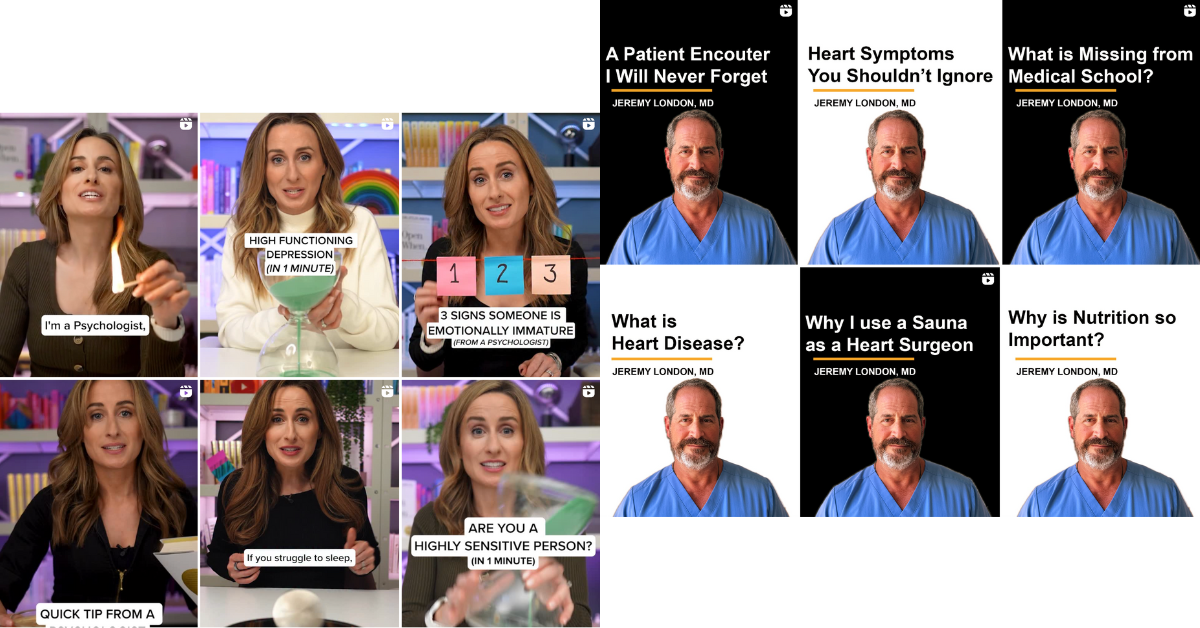You’re right to be concerned about “Dr Google” (but not for the reason you think)

If you’ve ever rolled your eyes or inwardly sighed at a patient who came in quoting a blog post, or started a sentence with, “I read online that...”, you’re not alone. Most clinicians have been there. And it’s easy to feel frustrated when someone with no training starts second-guessing their diagnosis or suggesting a treatment plan because of something they found on page one of Google.
But here’s the thing: while that reaction is totally understandable, it might actually be holding you back.
Because while it used to be true that “Dr Google” was awash with sketchy forums, half-baked wellness blogs, and fear-mongering clickbait . . . that’s not the internet your patients are using anymore.
Today, your patients are using a range of tools that pull from actual medical journals. They’re learning from qualified professionals online. They’re following specialist clinicians who are publishing evidence-based content in real time. And in some cases, they could be walking into your clinic with more up-to-date research based information than you’ve had time to read, digest, and evaluate.

So if you keep treating “Dr Google” like the enemy, you’re missing what’s really going on - and missing a golden opportunity to stand out in your industry and local area as an expert.
What “Dr Google” looks like now
Spoiler alert: It’s not what it used to be
Once upon a time, patients typed their symptoms into the Google search bar, skimmed the first few blog posts on page one, spent half an hour in a Reddit thread or Facebook group chatting with other unqualified but “experienced” patients, and arrived in your practice convinced they had three different conditions and a lifetime of worry ahead of them.
But that’s not what’s happening anymore.
Today’s search tools don’t just throw up pages and pages of blog posts, videos, community threads, and infographics for you to sift through. Patients are using AI platforms like ChatGPT, Claude, and Perplexity to summarise research articles and video interviews with the authors, review clinical guidelines, and cross-reference expert opinions. Instead of combing through 25 conflicting sources, they’re getting curated, concise summaries - often written in plain no no-jargon speak and backed by data.
Don't get me wrong, the output of this new breed of search tools is not always 100% accurate, but they are a big step forward from patients latching on to the information on one website and believing it to be 100% the full and true picture.
And it’s not just the tools that have changed. The content itself has had an upgrade.
A new wave of credible, qualified health professionals is now publishing directly to platforms like Instagram, Substack, and YouTube, sharing nuanced, evidence-based content on niche topics that matter deeply to specific patient groups.
We’re talking: pelvic health physios with followings of thousands of postpartum mums. ADHD specialists are breaking down the latest causative research. GPs explaining chronic fatigue in ways patients can actually understand. Well-read gynaecologists sharing research-backed best practices for postmenopausal women, and cardiac surgeons discussing risk factors like microplastics that no one else is talking about.
Your patients are not just being exposed to misinformation anymore. They’re being exposed to clinicians who look and sound like trusted experts - because they are.
And that changes the game.
The clinicians leading the way - and worth learning from

If you’re wondering what it actually looks like to “share your voice online” as a healthcare professional, you don’t have to reinvent the wheel. There are already clinicians doing this well, with integrity, clarity, and real authority, that you can emulate in your local area. You don’t have to be famous globally for this thing - but if you were, think of the amazing practice you could build and the 1,000’s of patients you could help 🤯
Here are a few of those practitioners doing it really well that you could learn from:
🩺 Medical & Preventive Health
- Dr Louise Newson – Menopause specialist, making evidence-based support mainstream. @menopause_doctor
- Dr Vonda Wright – Orthopaedic surgeon and healthy ageing expert. @drvondawright
- Dr Jeremy London – Cardiothoracic surgeon sharing research-driven education. @drjeremylondon
🧠 Mental Health & Psychology
- Dr Julie Smith – Clinical psychologist making mental health education simple, clear, and viral. @drjulie
- Dr Sophie Mort – Trauma-informed psychologist blending empathy with education. @_drsoph
🔬 Dermatology
- Dr Chris Tomassian – Known for mixing humour, education, and myth-busting. @dr.tomassian
🩻 Physio, Women’s Health & Rehab
- Sara Reardon, PT (The Vagina Whisperer) – Pelvic health made practical and unfiltered. @the.vagina.whisperer
- Dr Jennifer Arnold – Neonatologist and high-reach content creator discussing postpartum issues. @jenarnoldmd
These clinicians aren’t shouting into the void - they’re showing up with consistency, clarity, and compassion. They’re helping the public feel informed and empowered. And in doing so, they’re building both impact and authority.

And here’s the important part you need to understand: your patients are already watching them, bingeing their content, and learning from them, and they want more of that.
People with a problem want to feel heard and empowered, and these clinicians are doing that brilliantly on their social media accounts.
Your potential patients are comparing what they hear from these trusted voices to what they hear from you. So when the information doesn’t match, or worse, when they’re dismissed for bringing it up... that’s when your relationship with them begins to weaken.
The real threat isn’t misinformation - it’s potential professional complacency
OK, I need to say this out loud: "Patients having access to more information isn’t the problem."
The real issue? Practitioners who dismiss what their patients bring to the table because they feel threatened or undermined by it.
This isn’t about me saying every practitioner is struggling with this. But I still see plenty of clinicians being dismissive about what patients find online. And let’s be honest, we’ve all seen this coffee mug.

And I know some of us have liked or shared that post over the years . . . just saying 🙃
Feeling frustrated, maybe threatened, or insulted by our patients self-diagnosing online is a thing BUT please . . .
Cut yourself some slack
We all know how relentless running a small healthcare practice can be.
You’re juggling full calendars, never-ending admin, legislation changes, technological advances, HR issues, compliance updates, and somewhere in there, trying to have a life. Of course, keeping up with every new study, podcast episode, or clinical update isn’t always possible. In fact, it’s been shown that historically, it can take up to 17 years for medical research to make it from the pages of the research journals into everyday clinical practice.
So I’m not pointing the finger and talking about personal failure. It’s an industry-wide problem, a systemic lag. The point I want to make is that the timeline is shrinking, and not necessarily because of more structured training. It’s shrinking because patients now have easier access to the exact information clinicians have often had to dig for.
They’re learning directly from specialists who post about new findings the same week they’re published. They're finding summaries of peer-reviewed papers written in plain language by reputable AI tools or clinicians online.
So if a patient walks in quoting something they read online and your first instinct is to brush it off or get defensive, it’s worth pausing. Because that moment matters. How you respond can either strengthen their trust in you or quietly chip away at it. When practitioners dismiss, belittle, or eye-roll their way through a “Dr Google” conversation, even inwardly, a less than welcoming approach will be detected by the patient, and you risk coming across as out of touch - or worse, insecure. And once a patient starts to feel that shift? It’s going to take work to recover from that.

The GOLDEN opportunity: join the conversation
Here’s the good news: You don’t need to be an influencer with millions of followers. You don’t need to post dance videos on TikTok or post 40 times a week on Instagram.
You just need to understand what your patients are seeking. Decide where you want to take a stand. Pick a niche you care about. And engage with it constructively.
Start by staying curious. If a patient brings in something they read, ask for it. Read it with a critical but open mind. Is it well-referenced? Should it be something you look into more?
Also, pay attention to why they responded to that particular piece.
- Is it simple?
- Specific to their issue?
- Is it encouraging?
- Do they feel empowered by it?
- Does it make them feel understood?
- Could you say it better, or more clearly?
This is your opportunity to become part of the conversation, instead of feeling left behind by it.
Better yet, if you’re comfortable, start sharing your voice online. Your thoughts about the subject. Show your frustrations about myths with this subject. Share self-help tips. Promote groundbreaking research that will empower potential patients. It doesn’t have to be controversial. Just real, useful, evidence-based content, from someone local they can come to trust.
Go deep on one niche you’re confident in. Learn, share, teach, and build a reputation both clinically and geographically.
Because patients will keep searching. They’ll keep learning. And they’ll form opinions before they even walk through your door.
The question is - will they find you in the process?
This isn’t about battling with Google to retain your status as a qualified and experienced clinician. It’s about becoming the trusted, research-informed human voice your community wants to hear from.
That’s not just good marketing. That’s great healthcare practice.
Want to be the local expert on something? Start here

If this blog stirred something in you. A spark of, “Maybe I could be known for something in my community…” then what are you waiting for?
Here’s how to get started:
Step 1: 🔎 Spot the intersection
Ask yourself:
- What do I love treating?
- What do patients keep asking me about?
- What’s a common challenge in my area?
Your niche lives where your skill, your passion, and their problems meet.
Step 2: 🧑🏽🎓 Start learning → fast
- Search PubMed, Google Scholar, or professional sources for recent research
- Follow 3 to 5 credible thought leaders in that space and check in regularly with their content
- Bookmark reliable patient-friendly resources as sources for ideas later
Step 3: 📥 Curate before you create
- Start by resharing helpful content from other people with your commentary
- Be the translator: “This research stood out - here’s why it should matter to you.”
- Think filter, not influencer. Empowerment not lecturing
Step 4: 🧑⚕️ Create your own original content - rinse and repeat
- Something busting a common myth
- A blog breaking down a new study
- A 1-minute explainer video
Step 5: 📍Own it locally
- Don't be bland - have an opinion that makes you stand out and helps people
- Add your chosen niche or opinion to your website, Google, and social profiles
- Make a shareable PDF, info sheet, video, or blog that patients can reference and share
- Join relevant local Facebook groups and serve before you sell
- Talk about the thing everywhere, on and offline - remember your objective is to be famous locally for this thing
I hope that helps you see how doable this really is, and how powerful it can be when you show up passionate about something very specific, with the desire to help in a space that really matters to your potential patients. You don’t need to have it all figured out. You just need to start.
Because once you do? That’s when your expertise becomes visible, valuable, and genuinely life-changing, both for your patients and for your practice.
So, you don’t need a million followers, and you definitely do not need to be posting crazy dance videos or funny memes every day.
You just need clarity of purpose, a consistent message, and a real desire to help.
Because if your patients are going to keep searching (and they will), imagine if the practice that shows up is your’s → the one that’s actually in their postcode, where the people speak their language, and understand their story.
This isn’t about chasing virality (although hey, we won’t say no to it).
It’s about becoming famous locally for the thing you do best, and being the reliable, informed, trusted voice that cuts through the noise.
Because here’s the truth at the heart of this whole conversation:
Patients don’t want to be misled.
They don’t want to challenge your expertise.
They just want to feel informed, involved, and empowered in their own care.
So yes, “Dr Google” and online health search are here to stay.
But instead of fearing it, let’s meet it, and our patients, with intention, current knowledge, and eagerness to collaborate with our patients using it.
This is not the end of clinical authority.
It’s the future of patient-centred practice.
Thank you soooo much for taking the time to stop by my healthcare marketing blog today. I really hope you found value in spending some time here today.
I’d be so grateful if you could spare me just another 5 minutes to share your thoughts or questions in the box at the end of this page. What are you going to do differently now in your private practice?
Oh, and please use the social share buttons if you think other people you know might benefit from seeing this.
Until next time.
Thank you

Jill Woods
Healthcare Marketing Specialist
Founder of Practice Momentum


